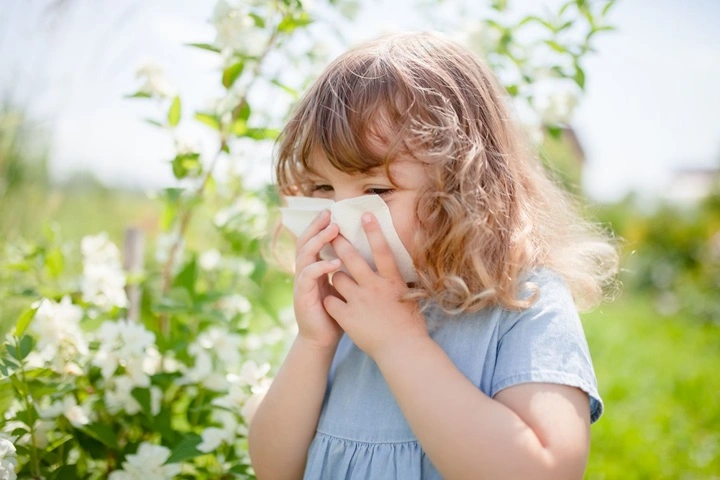As a parent, watching your child suffer from allergies can be distressing. Allergies in children are increasingly common, affecting millions worldwide. Whether it’s seasonal allergies, food allergies, or allergic reactions to certain substances, finding the right allergy medicine for your child is essential for managing symptoms and ensuring their well-being.
In this comprehensive guide, we’ll explore everything you need to know about allergy medicine for kids. From understanding different types of allergies to exploring treatment options and safety considerations, we’ve got you covered.
Understanding Allergies in Kids

- Types of Allergies
- Seasonal Allergies: These are triggered by outdoor allergens like pollen from trees, grasses, and weeds.
- Food Allergies: Common allergens include peanuts, milk, eggs, soy, wheat, fish, and shellfish.
- Allergic Rhinitis: Also known as hay fever, it causes symptoms like sneezing, runny nose, and itchy eyes.
- Allergic Conjunctivitis: Itchy, watery eyes are characteristic symptoms of this allergy.
- Allergic Dermatitis: Skin reactions due to contact with allergens like pet dander, pollen, or certain foods.
- Symptoms of Allergies in Kids
- Nasal congestion
- Sneezing
- Runny or stuffy nose
- Itchy or watery eyes
- Skin rashes or hives
- Difficulty breathing or wheezing
- Swelling of the face, lips, tongue, or throat
- Nausea, vomiting, or diarrhea (in case of food allergies)
Treatment Options for Kids’ Allergies
- Antihistamines
- Over-the-counter (OTC) antihistamines like loratadine (Claritin), cetirizine (Zyrtec), and fexofenadine (Allegra) are often safe and effective for children.
- Prescription antihistamines may be recommended for severe allergies or when OTC options aren’t sufficient.
- Antihistamines help relieve symptoms like itching, sneezing, and runny nose by blocking the action of histamine, a chemical released during allergic reactions.
- Nasal Corticosteroids
- Fluticasone (Flonase), budesonide (Rhinocort), and mometasone (Nasonex) are commonly used nasal corticosteroids.
- These medications reduce inflammation in the nasal passages, relieving congestion, sneezing, and runny nose.
- Nasal corticosteroids are often preferred for children with persistent allergic rhinitis.
- Leukotriene Inhibitors
- Montelukast (Singulair) is a leukotriene inhibitor that can be prescribed for children with allergic rhinitis or asthma.
- It helps by blocking the action of leukotrienes, substances in the body that contribute to allergic reactions and asthma symptoms.
- Decongestants
- Pseudoephedrine (Sudafed) and phenylephrine are decongestants that may be used to relieve nasal congestion in children older than 6 years.
- However, decongestants should be used with caution due to potential side effects like increased heart rate and blood pressure.
Allergy Medicine Safety Considerations for Kids
- Age Appropriateness
- Always ensure that any allergy medicine you give to your child is appropriate for their age.
- Some medications may not be safe for infants or toddlers, while others may have age-specific dosing guidelines.
- Dosage Accuracy
- Use the correct dosage of allergy medicine based on your child’s age and weight.
- Pay close attention to dosing instructions provided on the medication label or as directed by your healthcare provider.
- Potential Side Effects
- Be aware of potential side effects associated with allergy medications, such as drowsiness, dizziness, dry mouth, or upset stomach.
- Monitor your child closely for any adverse reactions and consult a healthcare professional if you have concerns.
- Drug Interactions
- Some allergy medications may interact with other medications your child is taking.
- Inform your child’s healthcare provider about all medications, including over-the-counter and prescription drugs, supplements, and herbal remedies, to avoid potential interactions.
Tips for Managing Kids’ Allergies Beyond Medication
- Allergen Avoidance
- Identify and minimize exposure to allergens that trigger your child’s symptoms.
- For seasonal allergies, keep windows closed during high pollen seasons and use air conditioning with a HEPA filter.
- In the case of food allergies, read ingredient labels carefully and inform caregivers and school personnel about your child’s allergies.
- Allergy-proofing the Home
- Regularly clean and vacuum your home to reduce indoor allergens like dust mites, pet dander, and mold.
- Encase mattresses and pillows in allergen-proof covers and wash bedding in hot water weekly.
- Maintaining Good Indoor Air Quality
- Use a high-efficiency particulate air (HEPA) filter in your child’s bedroom and other frequently used areas.
- Keep humidity levels below 50% to prevent mold growth.
- Promoting Healthy Habits
- Encourage your child to wash their hands frequently, especially before meals and after outdoor activities.
- Teach them to avoid sharing food, utensils, or personal items with others to prevent exposure to potential allergens.
Finding the right allergy medicine for your child involves understanding their specific allergies, symptoms, and medical history. While medications play a crucial role in managing allergy symptoms, it’s essential to consider safety precautions and explore non-pharmacological strategies for managing allergies effectively.
By working closely with your child’s healthcare provider and implementing appropriate measures to minimize exposure to allergens, you can help your child lead a healthier, happier life despite their allergies. Remember, every child is unique, so what works for one may not work for another. Stay informed, stay vigilant, and prioritize your child’s well-being above all else.


